Grandmother, grand tales
My mind spooled backwards in time a good forty years to my childhood and even more as I spent the long months of lockdown in Brahmapur Odisha, working on our new school …
Patna Calling
In the big old rambling house in Patna, with the conical tin roof that made a clattering sound as I ran over it with my heart in my mouth, the summer days stretched lazily. After the long train journey from Nellore, when I finally alighted with bits of coal sticking to my hair, the change of scene fascinated me. Each time we inched closer, I looked out for the big wooden gate that showed up suddenly, just after the Mahendru post office. We had reached our grandparents’ home.
The cool mud and brick walls of the rooms, the huge courtyard in the centre, the big guava trees below which mongoose lurked, the huge iron cauldron that lay upturned in one corner of the backyard, among the remnants of a soap factory my uncle ran from here. The Puja room with its cool red oxide floor where numerous Gods jostled for space and power on various pedestals, the family Gurudev’s hallowed footwear not to be outdone, resplendent on a separate stool, all these charmed, even intrigued me. Even without my knowing, over different visits through my growing years, the stage was set for tales to unspool like silkworms.
Grandmother’s Tales
When I asked my grandmother for stories, she told me the exasperating story of the prince whose exciting journeys would suddenly end with the note “Sobur Kar” meaning ‘wait awhile’. Then followed the travails of the famous prawn character, the staple of Bangla children’s folklore, “Chingri didi” perched on her lotus leaf, foiling the bid of the big bad fish who politely enquired each day if he could “eat her today” only to be met with the equally frustrating reply (to the fish) that “he could eat her on the morrow if he wished but certainly not today!” As a kid listening wide eyed, I could never fathom these stories ending in their undesired ways, it probably had something to do with the stubborn rice morsel finally moving down my gullet!!
Holidays at grandmother’s
The big wooden bedstead was raised high on two bricks probably to save it from the roughly hewn uneven floor or to gain more traction. Huddled under the big quilt on the pretext of reading my school textbooks (mother carried these pesky things along so that we kept busy even in the holidays), I took all in around me but the pages in front of me!
She was mixing us a snack of puffed rice in bowls with bits of chopped onion, mustard oil, and peas, moving to and fro, from the kitchen past her open big wooden almirah on which was arrayed the big box of betel leaves, nuts, a nut plier, lime and the “zarda tobacco”, giving the room its unmistakable aroma, the bottle of red hibiscus hair oil “Ranga Joba” and the McLeans toothpaste resting beside it which tasted good enough to eat!.
Witness to History
Though she did not say it in so many words, I realised she must have had an interesting childhood, growing up in the royal state of Darbhanga in North Bihar in the ‘30s. Her father was the manager of the estate of the erstwhile Maharaja. She was gifted a pair of silver knitting needles by the Raja’s daughter, seeing her keen interest in knitting. She recalled how during the British era, the considerable treasury of the state was sent off to an undisclosed location in great secrecy at the dead of the night in a caravan of forty trucks!
She talked of the great earthquake of 1934 when she lost a sister and remembered her mother frantically looking for her sibling calling out her name!
She had also travelled to Karachi once and when I asked how the doors and windows there looked like, she smiled, surprised, and said they looked as any door or window would anywhere, though I did not quite believe her!
Marriage into Chatterjee family from Khulna
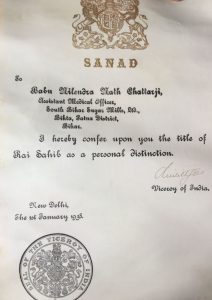 Coming to Patna post marriage, into the Chatterjee family who had migrated from Khulna in East Bengal in the beginning of the century, meant a big joint household where men stayed in one house and the women with children in another. The early years were tumultuous with the Second World War raging at this time. My Dadu (maternal grandfather), a doctor serving the British Indian army, often disappeared for long months, making sudden appearances from the war front, often quite unrecognizable when he returned. There were severe shortages of food and clothes. For lack of bedsheets, she once wrapped her first born in newspapers (news from the front was not in short supply obviously); that must have been very poignant.
Coming to Patna post marriage, into the Chatterjee family who had migrated from Khulna in East Bengal in the beginning of the century, meant a big joint household where men stayed in one house and the women with children in another. The early years were tumultuous with the Second World War raging at this time. My Dadu (maternal grandfather), a doctor serving the British Indian army, often disappeared for long months, making sudden appearances from the war front, often quite unrecognizable when he returned. There were severe shortages of food and clothes. For lack of bedsheets, she once wrapped her first born in newspapers (news from the front was not in short supply obviously); that must have been very poignant.
Grandfather’s adventures
The final time, Dadu returned with a miraculous escape. He was taken prisoner of war at Philippines. Due to face the firing squad the next morning, by some stroke of unexplained luck, he was literally kicked out of the camp by some unknown benefactor. He ran and ran and somehow managed to board the ship back to India!
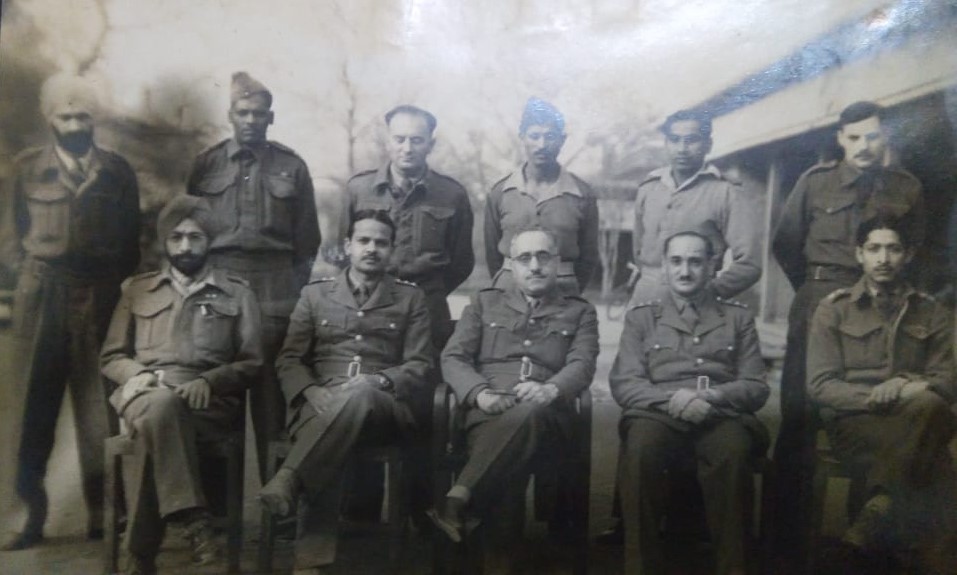
Working with the Dalmia sugar mills at Bihta, he once nursed back to health a whole trainload of British officers involved in a major derailment, serving them milk by the hour substituting for lack of medicines, thus saving many lives.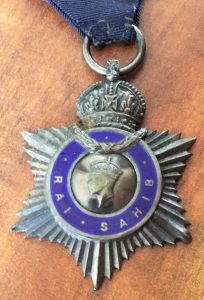
For this service rendered, he was awarded the title of “Rai Saheb” by the British government. Much later he settled down to a brisk private practice with his X-ray clinic, the prominent “Bijli Ghar” in Mechuatoli, Patna.
Before that came the tumult of Partition. Mobs and rumours of terrible happenings filled the air. The women and children were all herded to safety and the men moved in and kept vigil on the big tin roof day and night with swords, sticks, and everything handy! Her sister in law joined the men with her kitchen machete and the forest officer brother in law with his rifle. She had seen it all!
A good thirty years and a full life later, it was our turn to return to the old homestead, as granddaughters to this formidable lady. With her red bordered starched white sari, the twist of “paan” like lipstick, smilingly as she stepped to go outside, she looked rather fetching. She had been very pretty in her younger days, as I saw from the old family photographs.
The 70s: Music, temples, and the Ganga
Often I accompanied her to the Shiva temple close by, in which stood an amazing monolith three foot high. Stepping past a huge cowshed, where reposed scores of cows lowing amidst the hay and the dung, we walked past the stalls near the post office stocked high with toys. I treasured the shiny earthen “cookware” for the approaching Diwali festival when children in Patna made miniature mud houses and decorated with these toys for the “Gharkulla”. Memories of my uncle’s marriage are irrevocably linked with the sound of the loudspeaker at the corner blaring the foot tapping Kishore number “Khai ke paan Banaraswala” in its high treble. As our house was very close to the Law College Ghat of the river Ganga, Amitabh, “the chhora ganga kinare wala”, seemed a character straight out of Patna of my schooldays! I am sure the temple stands to this day like all places of worship do in our country. ’Immemorial custom is transcendent Law”, as Manu decreed.
In the evenings I often strolled with my grandfather past the Law College ghat admiring the wide sweep of the Ganga. He would point at the Gandak meeting the Ganga in the distance, with Sonepur on the other side. The Gangetic dolphins were aplenty and you could see them turning and tumbling in the centre of the river at sundown.
Water as Life
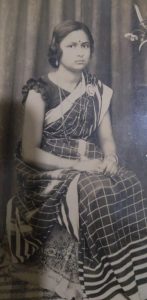 Water was life to my grandmother (Dida). Though water was always stored in the big tank in the bathroom there were times when the municipal taps ran dry. I’ve seen her literally cry over water. Calling out to her sister in law in a tearful voice as to when she was going to vacate the bathroom, so she could get at the water. In the kitchen where there was no proper plumbing barring a garden tap outside, colourful pipes ran into different coloured buckets on the mantel shelf, slab much like the gods in the puja room. Moving amidst the big tins stored with sugar oil and spices, my Dida presided over the most delicious ‘Kosha Mangsho’. This was her speciality on feast days. In the garden under the guava trees, a big stove with pieces of wood was set up. In a small cauldron next to the huge upturned one, she stirred endlessly her magic mutton roast!
Water was life to my grandmother (Dida). Though water was always stored in the big tank in the bathroom there were times when the municipal taps ran dry. I’ve seen her literally cry over water. Calling out to her sister in law in a tearful voice as to when she was going to vacate the bathroom, so she could get at the water. In the kitchen where there was no proper plumbing barring a garden tap outside, colourful pipes ran into different coloured buckets on the mantel shelf, slab much like the gods in the puja room. Moving amidst the big tins stored with sugar oil and spices, my Dida presided over the most delicious ‘Kosha Mangsho’. This was her speciality on feast days. In the garden under the guava trees, a big stove with pieces of wood was set up. In a small cauldron next to the huge upturned one, she stirred endlessly her magic mutton roast!
Once she overpowered a big poisonous snake that had somehow taken shelter in the cool shadowy bathroom. Though she tried to shoo it away, it barely budged and fearing the loss of a family member’s life, she went out and came back with a brick, hurling it at its head. A big crowd gathered on the road to watch the snake being burnt as the snake is very much a part of the pantheon of the gods.
In her old age, she left Patna for good and went to stay at Wardha. Once miffed over a water issue, she left Wardha in a huff, aiming to cover the entire distance to Nagpur on foot. She was cajoled and brought back, after someone spotted her standing tired under a tree by the roadside, a good 20 kms outside of town.
The great grandmother
Years later when she was great grandmother, I went to meet her, there she sat with hair askew, teeth missing, the ubiquitous cotton gown in place of her red bordered beautiful sari, blind in one eye, an incongruous pearl necklace placed lovingly round her neck as if to make up for all this, the cheery smile very much in place. Where my sons saw a mysterious old woman, I saw my beloved ‘Dida’.
One beautiful evening, as she watched with great delight my son crawling all over the roof, I pestered, “You never told me a complete story – you must tell me how the Chingdi didi’s story progressed”. What was her destiny, I needed to know. She quietly said, “it’s your moment to tell stories now, my job is done”.
But she did tell me the most beautiful story of her life ever…
The most beautiful story
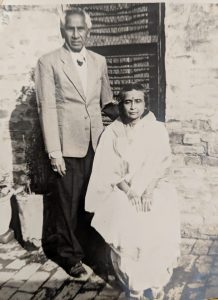 A hundred years back a “complement“ or an exchange marriage was common in Bengal. A brother and a sister from one family were married to a sister and brother from another. My grandmother, newly wedded to Dr. N.N Chatterjee of Patna, sailed in a boat with the marriage party, even as her brother was bringing back his bride from the very same family of Patna. As the boat swayed gently on the breast of the wide Ganga, a hundred dreams spun their gossamer threads in myriad hues before the young bride’s half closed eyes. She tried to steal a look at her bridegroom she had barely seen past the veils and garlands, the sound and the clamour of the wedding. A pot bellied short man with a balding pate sat opposite her. He was wearing the ceremonial flower garland of the bridegroom. Shocked, she looked away. It could not be!
A hundred years back a “complement“ or an exchange marriage was common in Bengal. A brother and a sister from one family were married to a sister and brother from another. My grandmother, newly wedded to Dr. N.N Chatterjee of Patna, sailed in a boat with the marriage party, even as her brother was bringing back his bride from the very same family of Patna. As the boat swayed gently on the breast of the wide Ganga, a hundred dreams spun their gossamer threads in myriad hues before the young bride’s half closed eyes. She tried to steal a look at her bridegroom she had barely seen past the veils and garlands, the sound and the clamour of the wedding. A pot bellied short man with a balding pate sat opposite her. He was wearing the ceremonial flower garland of the bridegroom. Shocked, she looked away. It could not be!
Again she looked and this time the man was chewing a wad of red paan and smiling at her. She was shattered. Her life was finished, she thought, why did her father choose this ugly man to be her husband?
Boat capsizes were common on the Ganga those days. Somehow the erroneous news reached the waiting family at Patna that there was a boat capsize and the whole party had drowned. So a pall of gloom set in, lights were put out and on such a dark and stormy night, the new bride arrived with her bridegroom and knocked on the door. Suddenly all hell broke loose; there was an uproar and people fell on each other to see for themselves the son and new bride intact. Amidst the gaily blowing conches and the auspicious ululations of the women folk, in the flickering golden glow of the oil lamps, she beheld the face of her tall and handsome husband with the grey eyes. The pot bellied man stood behind him, winking at her.
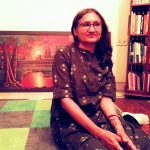 Author: Debjani Banerjee plays music, teaches English, and has fun with children and teachers at Klorofeel School, Brahmapur.
Author: Debjani Banerjee plays music, teaches English, and has fun with children and teachers at Klorofeel School, Brahmapur.
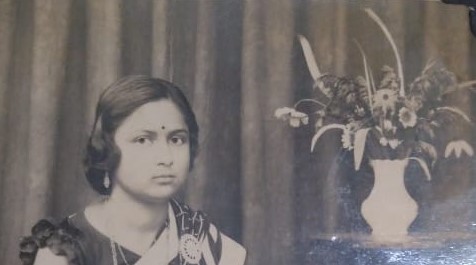
Beautiful minning of the sparkling gems of the bygone! Loved it!
Beautifully written, Debjani. The descriptions are so vivid, language is so apt, seems to be written by Ernest Hemingway. Live before your eyes.
I was not aware of this side of the story of your mama bari. Thank you.
Thankyou Kaku.
Very beautifully expressed Debjani, it is like creating a picture.I could actually imagine everything what you have written. Keep writing, it is a treasure of the past and must be relived and enjoyed. Also, should be recorded for our future generations.
Very interesting narration, enjoyed reading it👍
Splendid description of thoughts and memories associated with collection of events. My heartiest congratulations, Debjani.
Very well written Debjani.Captivated my interest till the very end..Keep on writing.. waiting for more.
Debjani – enjoyed reading it thoroughly. So much of similarity between your grand father and your father 😉 Would love to learn more about the pot bellied man.
Nothing more was heard about the pot bellied man 🙂
Loved every bit if it! This should be a book and not just a blog.. you have a magical way with words:) 👏🏾👏🏾
Beautifully written.
The picture of Great grand mother is very touching.
Down memory lane, amazing expression Debjani,your way with words. Could picturise every bit,charming Dida..Loved reading it,keep writing Debjani!
Down memory lane, amazing expression Debjani,your way with words. Could picturise every bit,charming Dida..Loved reading it,keep writing Debjani!
It is mesmerising. Many branches have to grow to make it a gigantic banyan tree. I will catch up in person.
Wow Debjani, what a charming narrative. You have made your wonderful stunning-looking Dida come alive. This should be a book. Such vivid descriptions and attention to detail…coal in the hair, yes, I remember those coal engine train days too! Keep going👍💕 Ye dil maange more!!
Who was the pot-bellied man?! What an amazing story-teller you are, Debjani! Such charming writing and vivid descriptions….coal in the hair, yes, I remember those train journeys too! You made your wonderful Dida come alive. Keep going. Write a book, please👍💕